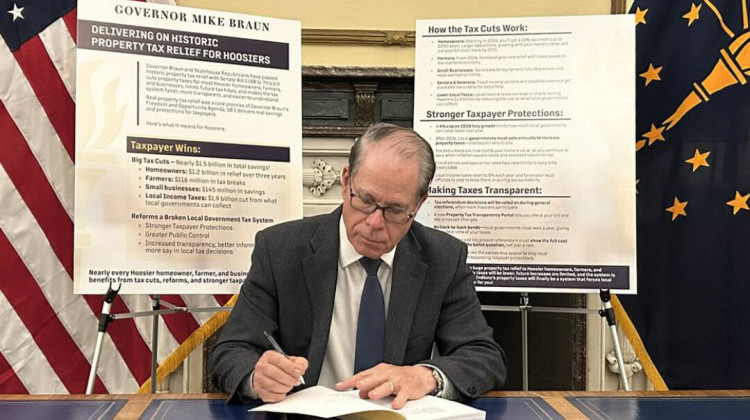
United Auto Workers President Shawn Fain talks with members picketing near a General Motors Assembly Plant in Delta Township, Mich., on Sept. 29, 2023. Fain is scheduled to update members today on bargaining with Detroit automakers as strikes against the companies head into their sixth week.
AP Photo/Paul Sancya, FileBy TOM KRISHER AP Auto Writer
United Auto Workers President Shawn Fain said Friday that while Detroit’s automakers have increased their wage and benefit offers, he believes the union can gain more if it holds out longer in contract talks.
In a Facebook Live appearance, Fain didn’t announce any more factories to add to those that have been on strike for up to five weeks. But he warned that the UAW could announce such an expansion of its strikes at any time, depending on how much progress it makes in its negotiations with the automakers.
In the past 24 hours, Fain said, Stellantis and GM have made wage offers that matched Ford’s 23% over the life of a four year contract. But, speaking in his characteristic sharp tones, the union president insisted that the companies can go further.
“We’ve got cards left to play, and they’ve got money left to spend,” he said.
Arguing that Ford “pretends they can’t afford what we’re asking for,” Fain noted that the company has complained about the union's walkout at the Kentucky Truck Plant in Louisville, which has had to shut down. That plant is the largest and most profitable Ford factory in the world.
Though Fain said the UAW will make an aggressive push to secure better contract offers, he contended that the companies are trying to divide union members.
“They just want to wait us out,” he said. "They want to divide. They want fear and they want uncertainty. What we have is solidarity.”
While the companies keep touting that they have made record offers to the UAW, Fain said they are insufficient to make up for how much ground workers have lost during the past two decades. Every time the automakers make an offer, Fain said, they insist it's the best they can do, only to return days later with a better offer.
“What that should tell you," Fain said, is that “there's room to move.”
In a statement, GM said it made an offer Friday with “substantial movement in all key areas in an effort to reach a final agreement with the UAW and get our people back to work.”
The company says the offer raises pay for most of the work force to $40.39 per hour, or about $84,000 per year by the end of a four-year contract. That's a 23% increase over the $32.32 per hour that most factory workers make. Compounded annually it's 25%.
The company also said it reinstated cost of living raises for many employees in the first year of the contract, boosting the pay increase to over 30% by September of 2027. Workers gave up the inflation-fighting raises in 2007 when the companies were in financial trouble.
GM previously had offered to contribute 8% of a worker's salary into 401(k) defined contribution plans.
The UAW had been seeking 36% raises over the four years.
Stephen McCray, one of the striking GM workers at a factory in Wentzville, Missouri near St. Louis, said the company's latest offer seems to be good, but he is suspicious that GM will wait a year to give cost of living increases.
A former temporary worker, he's concerned that part-time temps won't be converted to full time in the deal. That said, McCray thinks workers will ratify the contract because of the raises, cost of living pay, and other benefits, if Fain tells workers this is the best deal he could get.
“If this is what he's going to bring to the table, after everything that has been going on since September, I believe it will be ratified,” McCray said. “This might be the best that they might bring out.”
But Adrian Mitchell, a striking worker at GM's parts warehouse in Van Buren Township, Michigan, said increases in the 401(k) payment and for retirement health care aren't big enough. He doesn't think there's enough yet for a tentative agreement. “I think he should maybe fight a little more at the table to try to get a few more things,” Mitchell said.
It's not clear just when Fain may call on more workers to strike and join the 34,000 already off the job at six vehicle assembly plants and 38 parts distribution warehouses.
Masters said in order to settle with all three, Ford and Stellantis will have to join GM in agreeing to include future electric vehicle battery factories in the UAW national agreement. That would essentially ensure that the factories of the future would be represented by the union, a key point for the UAW.
Last week, before GM agreed to the battery plant provisions, the union had threatened to close a GM factory in Arlington, Texas, which makes highly profitable large SUVs.
The union's strikes at targeted plants at each company began on Sept. 15 and are nearing the start of their sixth week.
The UAW also is seeking restoration of defined benefit pensions that workers gave up in the Great Recession, pension increases for retirees, an end to varying tiers of wages for workers and other items. GM's offer appears to end the tiers in the last year of the new contract.
GM said Thursday that it can't give Fain everything he wants because it needs profits to invest in future vehicles and factories. Ford and Stellantis have made similar comments, with Ford saying it has reached the limit on how much it can spend to settle the strike.
The union, however, says labor expenses are only about 5% of a vehicle's costs, and the companies can divert money from profits and stock buybacks to pay for raises that cover inflation and make up for years of contracts without significant increases.
The strikes started with one assembly plant from each compan, and the union later added the parts warehouses, then one assembly plant each from Ford and GM. Last week the union made a surprise move, escalating the strikes by adding a huge Ford pickup truck and SUV plant in Louisville, Kentucky.
About 23% of the union's 146,000 members employed by the three automakers are on strike.
 DONATE
DONATE






 Support WFYI. We can't do it without you.
Support WFYI. We can't do it without you.